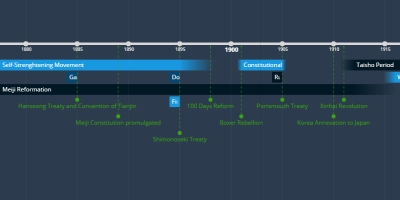First Opium War (jan 1, 1839 – jan 1, 1842)
Description:
Background:Before the Opium Wars occurred, China had maintained itself as a the central power in the region with itself at the center and its relations with other states through a tributary system. People who did not accept Chinese culture were labelled as barbarians while the tributary states, such as Korea and Vietnam, gained China's protection as the cost of sending money and good to the emperor. Internally, China was very self-sufficient; its agriculture, unlike the West, had no need to innovate or incorporate technology because farming was intertwined with population size and families determined how many children they would have based on agricultural output. Classes in China were also based on Confucian hierarchy with the emperor and nobles at the top, farmers below them, and merchants and artisans at the bottom. When western countries came to trade, they were seen as barbarians and were asked to submit to being treated as a tributary state. Eventually, dissatisfaction with the Canton trading system as well as a desire to increase opium exports would lead to conflict between China and Britain.
The Canton trading system allowed foreigners to trade by anchoring their ships in the port and conduct their trade through hong firms and with the help of comporadores and then return to their ships at night. While the westerners wanted trade based on law and diplomatic equality, China insisted on treating them as tributary states. When the trade balance shifted in favor of Europe due to opium imports, the west, particularly Britain, insisted on establishing extraterritoriality and obtains charters to establish permanent embassies. The trade imbalance drained China's economy of silver and the number of opium addicts was harming the local economy.
Development:
With the rise in opium imports, Lin Zexu was appointed to eradicate the opium trade. He confiscated and destroyed large amount of opium and implemented harsh punishment for sellers of Opium. In response, British traders urged their government to protect their firms through military actions. After a series of British- won naval battles, the Treaty of Nanjing was signed in 1842, signalling the end of the First opium war. China agreed to pay indemnity to Britain, abolish the Canton trading system, and ceded Hong Kong as well as opened up five treaty ports.
Implications:
The First Opium War would signal the beginning of a series of unequal treaties between China and other western powers. The economy would be severely hurt, with the burden of the rise in the price of silver falling on the peasants, who traded with copper but paid their taxes in silver; this will cause civil unrest and is one of the causes of the Taiping rebellion. China becomes a semi-colonial state after the opium wars but this is also only the beginning of China's exposure to the West.
Added to timeline:
Date:
jan 1, 1839
jan 1, 1842
~ 3 years
